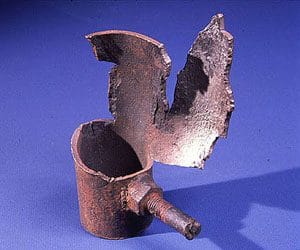Boiler Failures Due to Corrosion – Part 4
Boiler Failures Due to Corrosion - Part 4
Corrosion Due to Copper
One of the corrosion-induced failures that can occur in a boiler result from copper deposits that produce corrosion. Pitting of boiler drums and tube banks has been encountered due to metallic copper deposits, which form amid acid cleaning procedures that do not completely compensate for the number of copper oxides in the original deposits. When dissolved copper is plated out on freshly cleaned steel surfaces, they develop anodic corrosion areas and form pits which appear similar to those pits caused by oxygen.
When such situations occur, metallic copper plating is apparent. Usually, these are located in certain tube banks, creating patches of random pitting in those areas. Certain precautions are necessary to prevent the plating out of copper during cleaning operations when these deposits are found to be containing large quantities of copper or its oxide.
Copper deposits and temperatures over 1600ᵒF can cause liquid metal embrittlement. Weld repair of a tube containing copper deposits can lead to failures.
Hydrogen Attack or Embrittlement
Hydrogen attack, or embrittlement, has been found more and more frequently in high-pressure, high-purity systems since about 1960. These cases of corrosion are not found in the average industrial plant because they operate below pressures of 1500 psig where the embrittlement usually occurs.
In systems of this type, the alkalinity of the boiler water is maintained at values that are quite low compared to usual standards for lower-pressure operation. At the operating pressures indicated and water conditions imposed, either coordinated pH/phosphate or total volatile programs are used. Due to the boiler water being relatively unbuffered, total volatile programs are more affected by the contaminants that may lower boiler water alkalinity or pH.
When these contaminants significantly lower the boiler water pH, the acid attack of the steel generates hydrogen. This hydrogen can pressurize and penetrate the steel tubing if this happens under hard, adherent, nonporous tube deposits.
 When atomic hydrogen permeates the metal structure, it reacts with the carbon content to form methane. While the methane molecule is too large to distribute through the steel, undue pressure increases within the metal structure, causing the metal to rupture alone the crystalline boundaries where methane has formed. This produces cracking that is primarily intercrystalline or intergranular in nature, while the metallic area affected becomes decarburized in the process. If the ruptured section is unable to withstand the internal pressure, failures that can be violent, abrupt, and destructive, occur. Failed sections of tubing are cracked in the intergranular mode and decarburized, but usually retain the original dimensions or thickness of the tubing material.
When atomic hydrogen permeates the metal structure, it reacts with the carbon content to form methane. While the methane molecule is too large to distribute through the steel, undue pressure increases within the metal structure, causing the metal to rupture alone the crystalline boundaries where methane has formed. This produces cracking that is primarily intercrystalline or intergranular in nature, while the metallic area affected becomes decarburized in the process. If the ruptured section is unable to withstand the internal pressure, failures that can be violent, abrupt, and destructive, occur. Failed sections of tubing are cracked in the intergranular mode and decarburized, but usually retain the original dimensions or thickness of the tubing material.
Low boiler water pH is most commonly caused by the use of brackish water for condenser cooling. Small quantities of magnesium chloride have caused extremely low pH excursions, requiring close monitoring and detection of very low levels of contamination in the condensate.
In summary, hydrogen embrittlement occurs only when a hard, dense scale is present on the surfaces of the tubes, thus permitting hydrogen to concentrate under the deposit and permeate the metal. These developments of hydrogen are usually produced by acidic contamination or notably low pH excursions. These attacks develop quickly and require continuous monitoring of the purity of the condensate.
As previously mentioned, hydrogen embrittlement is usually found in high-purity systems that operate at 1500 psig or higher. While similar to intergranular creep cracking, this embrittlement is recognizable by the distinct intergranular nature of the cracking and decarburized condition of the metal.
Units that function at these pressures and under these conditions have generally shown that the utilization of a coordinated pH/phosphate control will lessen the possibility of hydrogen embrittlement. This is due to the enhanced buffering of the boiler water with phosphate present.

